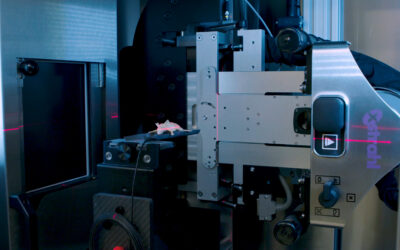Painful shoulder syndrome currently has a limited volume of treatments, however recent studies have suggested long term pain reduction could be a possible treatment.
In their paper “The Erlangen Dose Optimization Trial for radiotherapy of benign painful shoulder syndrome. Long-term results” Ott OJ, Hertel S, Gaipl US, Frey B, Schmidt M, Fietkau R evaluate the long-term efficacy of pain reduction by two dose-fractionation schedules for radiotherapy of painful shoulder syndrome.
Between February 2006 and February 2010, 312 evaluable patients were recruited for this prospective trial. All patients received low-dose orthovoltage radiotherapy. One course consisted of 6 fractions in 3 weeks. In the case of insufficient pain remission after 6 weeks, a second course was administered. Patients were randomly assigned to one of two groups to receive single doses of either 0.5 or 1.0 Gy. Endpoint was pain reduction. Pain was measured before radiotherapy, as well as immediately after (early response), 6 weeks after (delayed response) and approximately 3 years after (long-term response) completion of radiotherapy using a questionnaire-based visual analogue scale (VAS) and a comprehensive pain score (CPS).
Median follow-up was 35 months (range 11-57). The overall early, delayed and long-term response rates for all patients were 83, 85 and 82 %, respectively. The mean VAS scores before treatment and those for early, delayed and long-term response in the 0.5- and 1.0-Gy groups were 56.8 ± 23.7 and 53.2 ± 21.8 (p = 0.16); 38.2 ± 36.1 and 34.0 ± 24.5 (p = 0.19); 33.0 ± 27.2 and 23.7 ± 22.7 (p = 0.04) and 27.9 ± 25.8 and 32.1 ± 26.9 (p = 0.25), respectively. The mean CPS values before treatment and those for early, delayed and long-term response were 9.7 ± 3.0 and 9.5 ± 2.7 (p = 0.31); 6.1 ± 3.6 and 5.4 ± 3.6 (p = 0.10); 5.3 ± 3.7 and 4.1 ± 3.7 (p = 0.05) and 4.0 ± 3.9 and 5.3 ± 4.4 (p = 0.05), respectively. No significant differences in the quality of the long-term response were found between the 0.5- and 1.0-Gy arms (p = 0.28).
They concluded that radiotherapy is an effective treatment for the management of benign painful shoulder syndrome. For radiation protection reasons, the dose for a radiotherapy series should not exceed 3.0 Gy.
This Xstrahl In Action was adapted from a article found on a National Library of Medicine website.







